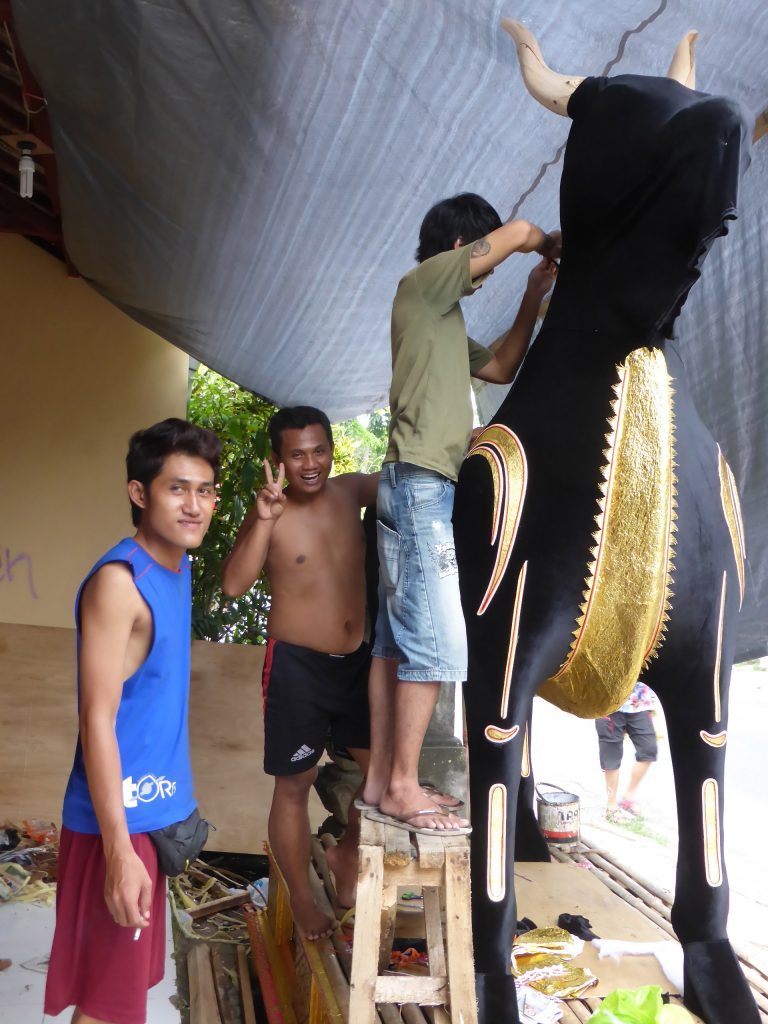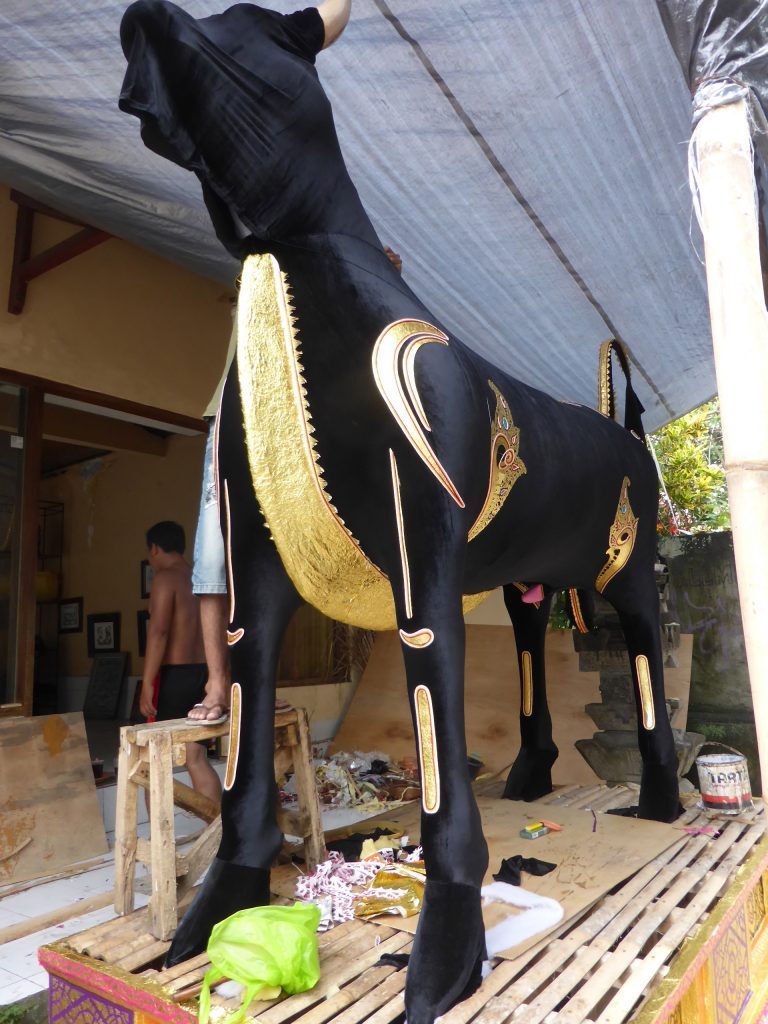Making the Sarcophagus
What in the world are they making? I ask myself as we approach a young Balinese man standing atop a ladder, with two other young men assisting him. The man on the ladder appears to be sewing the final touches on a larger-than-life bull piñata.


With a quizzical look on my face, I ask “What is it?”
The man on the ladder responds, “We make for burn.”
“Huh?” I stupidly respond.
“For cremation. Man die. Body go in here.”
Slowly beginning to understand, I seek clarification, “Ohhhh, it’s a sarcophagus. So the body goes inside, then you cremate it?” (Sarcophagus is much more tactful than piñata.)
As he nods in agreement, I’m reminded of just how interesting Balinese beliefs and customs are compared to ours, particularly when it comes to death and reincarnation.
Christian vs. Balinese Hindu Beliefs
As a Protestant Christian, our beliefs and customs pertaining to death are quite simple:
- Upon death, the soul ascends to heaven where it is reunited with loved ones who have passed before.
- A funeral service is held for family and friends, and the body is buried or cremated.
For Balinese Hindus, things are much more complicated.
Bali is the only part of Indonesia that is not predominantly Muslim. On the island of Bali, over 90% of the people are Balinese Hindus. The ancient Balinese practiced Animism, the belief that non-humans–like animals, plants and rocks–have souls and must be given offerings to maintain harmony. When Hinduism found its way to Bali centuries ago, the Balinese combined it with Animism creating their own religion: Balinese Hinduism.





One of the core beliefs of Balinese Hinduism is reincarnation. Cremation is the only way to release the soul from the body to allow reincarnation to occur. As such, an adult child’s most important duty to his parents is to carry out a proper cremation ceremony for them.
Sounds simple enough, right?
Unfortunately not.
Cremation ceremonies
The challenge is that cremation ceremonies are very expensive. The average cost is $20,000-25,000 USD. Ouch! Only the wealthiest and highest caste Balinese can afford that. Now imagine that you are a typical Balinese worker and your income is $125-150/month. That makes it a bit difficult to ensure that Mom and Dad get reincarnated.
As a solution, many villages have mass cremation ceremonies every five or so years. Each family pays $400-500 per family member being cremated. During the waiting period, between death and cremation, the body is temporarily buried in a shallow grave cemetery. However, since the soul is still attached to the body, it is important to make offerings to the spirits of the deceased to keep them happy while in this in-between stage.




A Balinese cemetery looks similar to a Western cemetery, except that litter covers the site. Graves overflow with the offerings–water, snacks, drinks, even favorite treats–left by family members of the deceased. The spirit consumes the “essence” of the offering. Once the essence has been consumed by the spirit, the neighborhood dogs enjoy the remains.
When the mass cremation day arrives, it is a huge celebration. Exhumed bodies are placed in sarcophagi lined up in a row. Firewood is placed below each sarcophagus and they are lit on fire. While they burn, a high priest conducts a ceremony to release the souls. Family members are joyful, as displays of grief could inhibit the reincarnation process. When the burning is complete, family members collect the ash and bone, and throw the remains into the river or sea.
However, the process still is not complete. Twelve days later, another death ceremony, called nyekah, takes place. It is similar to the previous ceremony, except this final ceremony releases the soul for good so it may be reincarnated. Whether a person is reborn as something awful (like a rat), or something wonderful (like a grandchild), all depends on the good deeds of the previous life.
My Thoughts
As intrigued as I am with the Balinese Hindu customs and beliefs, I have to admit that I prefer our Protestant Christian beliefs. As a planner and control freak, I like the idea of:
1) having my eternity plans all squared away before I die, and
2) not depending on the actions of others after my death to make it happen.
However, if I thought I would come back as either my dog or one of my kids, I just might reconsider reincarnation.
To learn about Bali’s unique baby-naming customs, read Why the Balinese Don’t Need Baby Name Books.

Ready to explore the world? Then check out THE PASSPORT PROJECT and THE ULTIMATE TRAVEL TRACKER to inspire and manage your wanderlust.


Interested in more epic adventures? Check out the following:
- Camping in Antarctica: Everything You Need to Know to Survive
- How to Save Thousands on Your Family’s Galapagos Adventure
- Ten Day Namibia Road Trip: Sand, Seals, and Safari
- How to Plan a Budget Vacation to the Luxurious Maldives
- How to Book an Amazing and Affordable South Africa Safari
- No Regrets: Bungee Jumping in Queenstown, New Zealand
- The Passport Project: A DIY Journey Around the World
Interested in more cultural adventures? Check out following:
- Three Tips for Ethically Visting Myanmar‘s Long-Neck Women
- How to Volunteer at Delhi’s Gurudwara Bangla Sahib Sikh Community Kitchen
- Burial, Cremation, and Reincarnation in Bali
- Learn to Meditate at Truc Lam, Da Lat, Vietnam’s Buddhist Monastery
- Family Travel Idea: Spend the Night with the Embera Puru Indians in Panama
- Don’t be Flashy! Guidelines for Luang Prabang’s Alms Giving Ceremony
- Cambodia‘s Genocide: What I Never Learned in School
[…] Burial, Cremation, and Reincarnation in Bali […]
[…] stressful night in an airport hotel. It was our final night in New Zealand prior to departing for Indonesia. We all congregated in the hotel bar because it was the only area with free WIFI. Dale and I […]
[…] other faith-based travel experiences, check out these posts on Balinese Hinduism, Buddhism, and […]
[…] Burial, Cremation and Reincarnation in Bali […]
[…] Burial, Cremation, and Reincarnation in Bali […]
[…] To learn about Bali’s unique burial and cremation customs, be sure to read Burial, Cremation and Reincarnation in Bali. […]
[…] Burial, Cremation and Reincarnation in Bali […]
[…] One of the reasons why Bali is called the “island of the Gods” is because of their huge display of respect to the Gods. Everywhere you go, you’ll see Hindhu temples and canang saris, which are daily offerings by the Balinese Hindhus. You’ll even find displays of worships on the beach. The Balinese also have fascinating beliefs about burial, cremation, and reincarnation, which you can read more about on this blog post […]
So interesting! Thanks for sharing! So how is everyone feeling as you are nearing the end of your journey- Ready to return? Longing for more time? Just wondering about your “re-entry”…. LP will be glad to have you all back 🙂
Well guess what?? We snuck back into the neighborhood under the cover of darkness late Saturday night. We didn’t tell anyone we were returning. The girls surprised their friends at lunch yesterday. They are still homeschooling for the next two weeks to get caught up and will rejoin their friends at school on March 10.
More posts still to come though. Our biggest adventure of all (and not the good kind) was at the very end of our trip!
Love hearing about these traditions. I feel like I’m back in my college Eastern Religion class, except you are really seeing what I read in a text book. What an awesome way to experience the world. By the way, the professional photographer that you brought along is amazing!!!! Anxiously anticipating your return and hearing more about this incredible journey.
What if you die and your soul is reunited with loved ones AND you are reincarnated? Uh-oh, I hope that sound I just heard wasn’t your control costume falling away 🙂
Then that would be awesome. Should have known you’d be the first to comment on this!